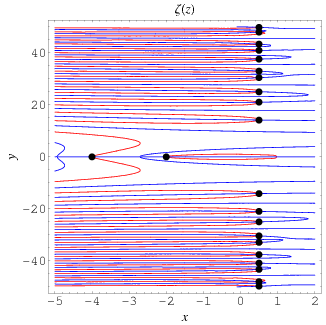The black dots are zeros.......................all along 1/2......which is what B Riemann said they were all along............also the negative even numbers.........all of them...........two...........a number is even b/c it is a product of 2................1/2 is 2 to the negative one................but I think it is b/c u used an even number of variables..............4...........therefore 4 dimensions...........the way he set it up matters...........as an electron will create a wave interference pattern or just a two lines..........based on how u set up the experiment..............u put a camera at one of the slits.........the thing collapses back into acting like a particle...........which is where they got the whole Copen. interpretation.........collapse of the wave function.........................
Sums of waves........a crest meeting a trough would cancel each other out.........
The plots above show the real and imaginary parts of

plotted in the complex plane together with the
complex modulus of

. As can be seen, in right half-plane, the function is fairly flat, but with a large number of horizontal ridges. It is precisely along these ridges that the nontrivial zeros of

lie.

The position of the complex zeros can be seen slightly more easily by plotting the contours of zero real (red) and imaginary (blue) parts, as illustrated above. The zeros (indicated as black dots) occur where the curves intersect.

No comments:
Post a Comment